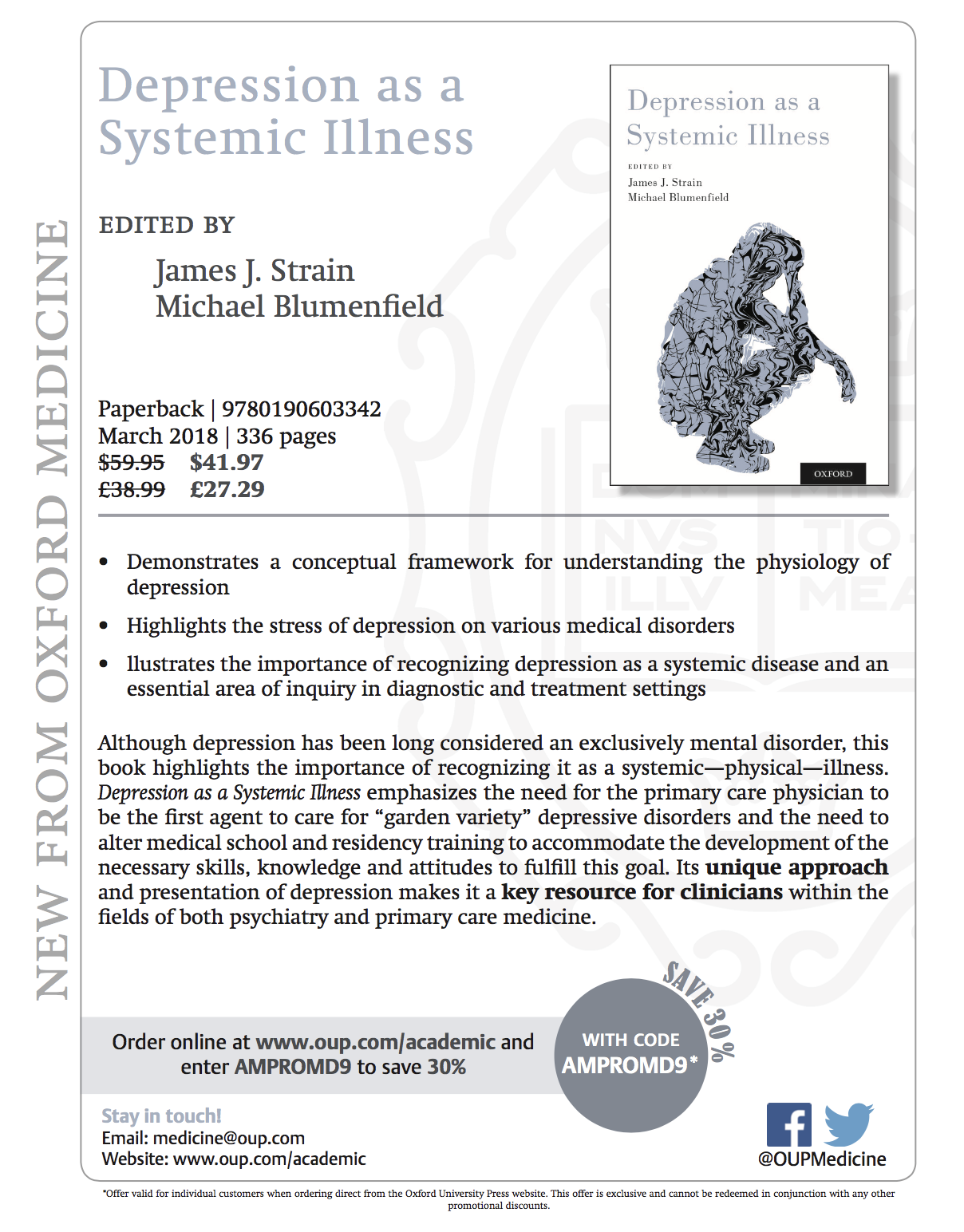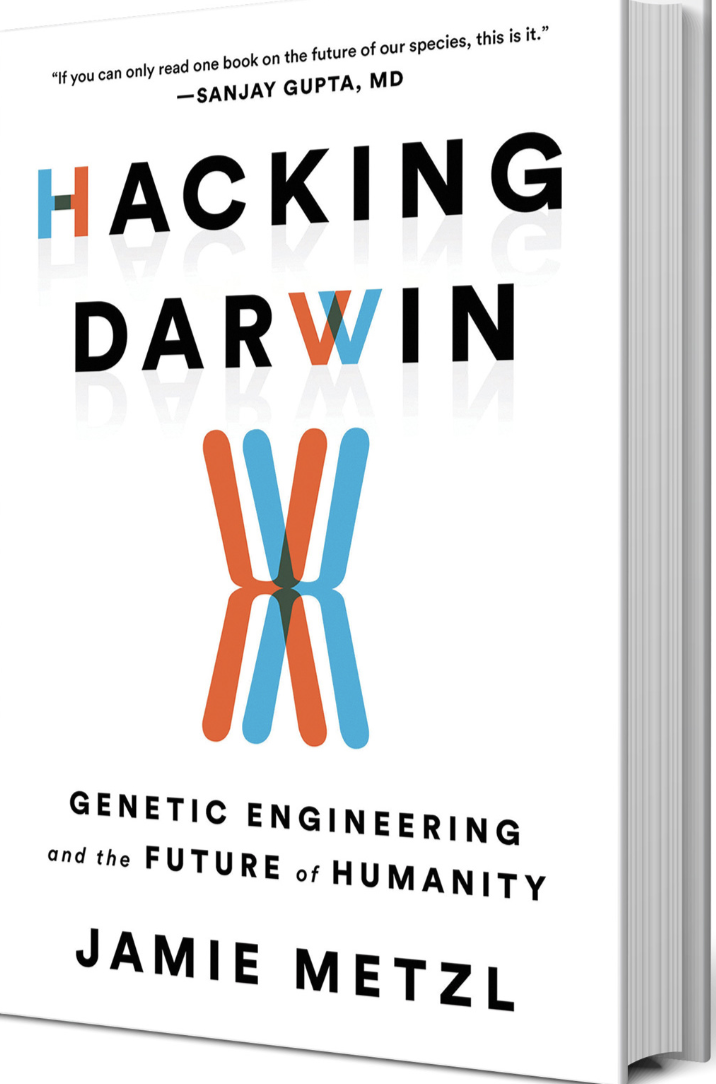Note:
Todays book blog features a book which I had the pleasure of recently co-editing with my colleague Dr. James Strain. I have reproduced below the forward to the book written by Dr. Herbert Pardes. The publisher has given me permission to offer the readers of this blog a 30 % discount for purchase of it if you use the code in the coupon at the end of the blog
 Depression As A Systemic Illness – edited by James J, Strain, M.D. and Michael Blumenfield, M.D.
Depression As A Systemic Illness – edited by James J, Strain, M.D. and Michael Blumenfield, M.D.
Forward to book- Written by Herbert Pardes, M.D. ( Former Director of National Institute of Mental Health and former President of the American Psychiatric Association )
Depression occupies the minds and work of people of diverse disciplines. Prior to the introduction of anti-depressive treatments, depression was widely treated with interventions like electric-convulsive therapy (ECT). In the mid-1900s, the first monoamine oxidase inhibitors (MAOIs) and tricyclic antidepressants (TCAs) were introduced. For decades subsequently, much research focused on such treatments. Depression was considered a mental disorder. The focus on these antidepressants was followed over the next five or six decades with few new developments.
This book stresses the breadth of the topic, describing depression as a systemic illness, not just a mental illness. The best thinking today is that there are new tools and concepts in research, awareness of multiple causes, multiple kinds of depression, and increasing recognition of the mechanics and physiology that produce them. The book creates an optimistic and innovative approach to understanding and treating depression.
Brain plasticity is remarkable. Much current focus has been on brain action. However, this text uniquely conceives of depression as systemic, resembling other non-psychiatric chronic illnesses such as diabetes, hypertension, asthma, congestive heart failure, etc.
New research techniques have generated a conviction that integrating diverse lines of research enhances the promise for advances in understanding the disorder of depression. Another conviction among depression experts is that clinicians and scientists should focus on earlier stages of the disorder. Early intervention appears to produce better outcomes. Also, there is a greater focus on the continuing effects of depression.
Brain plasticity and recognition of depression’s pervasive impact throughout the body—McEwen’s “allostatic load”—has induced scientists to examine enduring and long-term effects of depression. More depressive episodes and longer periods of depression appear to be correlated with more serious states of depression.
Contributory causes are multiple—genetics, family history, adverse childhood development, environmental stress, etc. Depression is highly heterogeneous. For example, when youth have persistent anxiety and/or depression as well as mental lability, subclinical mania, accompanied by parents with early-onset bipolar disease, 50% of such children also develop bipolar disease.
The systemic nature of depression with the many interconnections also results in omnipresent comorbidity. This new text explores, e.g., cancer, heart disease, and neurological disorders in this regard.
New treatment approaches being developed make use of neuroimaging, brain stimulation, and substances like ketamine. The latter produces rapid improvement in mood rating in patients resistant to typical antidepressants, but it may have a minimal lasting effect if not serially repeated; it is not as yet FDA-approved for depressive disorders.
There are five different types of transcranial medical stimulation (TMS). In some, TMS generates brain tissue regrowth over four- to six-week periods. Treatments like cognitive behavioral therapy work on circuits. Interpersonal therapy, too, is being used in creative ways in underdeveloped countries. One emphasis is looking for interventions that may foster synaptic plasticity and connections.
The enthusiasm of many scientists is palpable. Some assert that we are undergoing “a scientific revolution in mood disorder research is anticipated.” Encouraged by advances in cancer treatment through precision medicine, some foresee possible application of precision medicine to depression. The rich knowledge being developed from neuroimaging has led to “neuroimaging phenotypes,” which means an imaging picture shared widely by many depressed patients.
These developments are significant for education. The impact on training, the important role of primary health care professionals, the potential of psychoeducation are pertinent educational issues. Should primary care physicians not be able to diagnose and care for “garden variety” depressive disorders, and then, if necessary, refer refractory patients on to more experienced clinicians? Medical school curricula and residency training will need to be altered for non-psychiatric physicians to have sufficient skills to accomplish this.
Depression deserves recognition as an illness of major proportions. It affects vastly different body systems. The World Health Organization ranks it as exacting the greatest burden of illness on the world population. Innovative treatments and ideas provide optimism.
Considering it a systemic illness represents a change from the former perspective that brought patients with depression brief interludes of relief with ECT, psychotherapy, and/or drugs while ignoring the long-term course and its biological accompaniments. We deal with a longstanding illness that needs enduring attention. If treated early, and if one can modify the number, intensity, and length of episodes, we will be likely to produce improved outcomes.
This formulation of depression as a systemic illness, not just a mental illness, may also be welcomed, recognizing the many decades in which psychiatric illness and treatment suffered from stigma. Outstanding innovative leaders from many fields grasping the breadth of depression’s impact are working together, accumulating vast data and manifesting enthusiasm about possible major strides going forward.
This rich book brings experts together and covers extensively the biological, psychological, endocrinological, genetic, and imaging aspects of depression. This collaboration by outstanding scientists and clinicians represents probably our greatest hope for real improvement in the management of depression. It is well described here. While not minimizing how much has to be done, this is an uplifting book, given the excellence of its contributors and their laboratories, and the proliferation of new and imaginative tools and concepts to advance the effort to bring depression under control.

To purchase this book directly from Oxford University Press at a 30% discount please follow the directions in the discount coupon above and use the promo code in that coupon or note this code ” AMPROMD9 “and click here
To purchase Psychosomatics a text book edited by Dr. Michael Blumenfield and Dr. James Strain please click here
To purchase Psychosomatic Medicine ( 2nd edition) a text book written by Dr. Michael Blumenfield and Dr. Maria Tiamson please click here
To purchase Intervention and Resilience After Mass Trauma a text book edited by Dr. Michael Blumenfield and Dr. Robert Ursano please click here
To purchase Psychological Care of the Burn and Trauma Patient a text book written by Dr. Michael Blumenfield and Ms. Margot Schoeps please click here
To purchase Applied Supervision in Psychotherapy a text book edited by Dr. Michael Blumenfield please click here
Continue reading »
 This story is about an elite family that has owned an island off the coast of Maine for 3 generations. It started with a wealthy couple Ogden and Kitty Milton in the 1930s. Ogden Milton ran a bank that may have had some secret dealings with the Naizis during that time. Ogden and his wife seemingly had everything until tragedy struck them. In response to their grief, they purchased the island and made a tradition of yearly visits to the island every year as the family would grow with new generations. The prejudices and complex feelings became apparent as time went on. A Jewish man gets a job in the patriach’s bank and he becomes involved with one of the daughters. His best friend from Harvard, a black man, also joins one of the family get-togethers on the island.
This story is about an elite family that has owned an island off the coast of Maine for 3 generations. It started with a wealthy couple Ogden and Kitty Milton in the 1930s. Ogden Milton ran a bank that may have had some secret dealings with the Naizis during that time. Ogden and his wife seemingly had everything until tragedy struck them. In response to their grief, they purchased the island and made a tradition of yearly visits to the island every year as the family would grow with new generations. The prejudices and complex feelings became apparent as time went on. A Jewish man gets a job in the patriach’s bank and he becomes involved with one of the daughters. His best friend from Harvard, a black man, also joins one of the family get-togethers on the island.













 What if during the stage of life that you will be planning a family, your doctor told you that it could be arranged so that your future child would have the best of yours and your partner’s genetic makeup? Isn’t that what everybody hopes for? Suppose it could also be arranged that your future child would not get cancer, diabetes and other serious illnesses and would lead a long and healthy life. In addition, you could choose for your offspring to have a very high IQ and great athletic ability? While you are at it, you could also choose to have this precious child have an outgoing, empathic personality.
What if during the stage of life that you will be planning a family, your doctor told you that it could be arranged so that your future child would have the best of yours and your partner’s genetic makeup? Isn’t that what everybody hopes for? Suppose it could also be arranged that your future child would not get cancer, diabetes and other serious illnesses and would lead a long and healthy life. In addition, you could choose for your offspring to have a very high IQ and great athletic ability? While you are at it, you could also choose to have this precious child have an outgoing, empathic personality. Depression As A Systemic Illness – edited by James J, Strain, M.D. and Michael Blumenfield, M.D.
Depression As A Systemic Illness – edited by James J, Strain, M.D. and Michael Blumenfield, M.D.